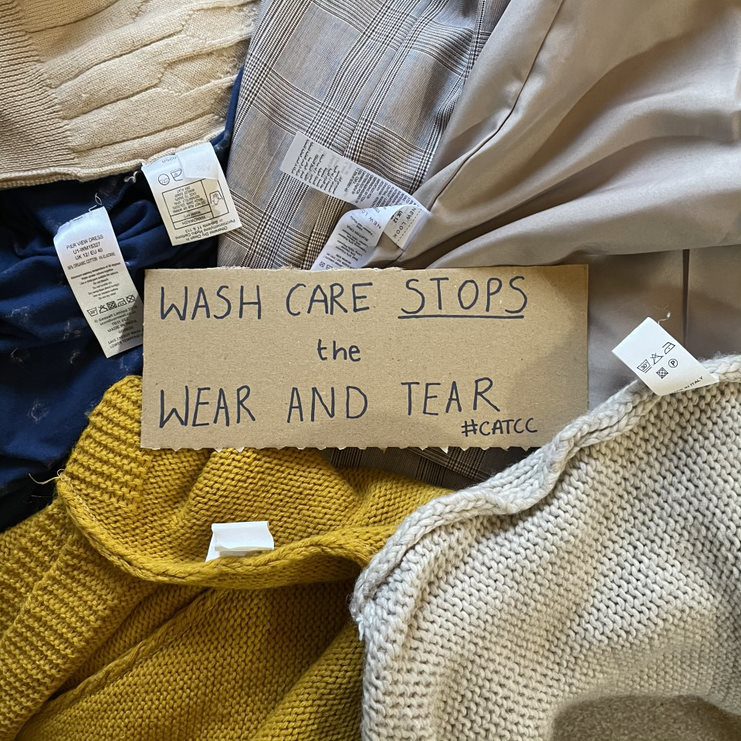Concerned about the clothing crisis? Wash care stops the wear and tear by Creative Writing Student Trudi Holland, edited by Amber Horne.

Why is understanding wash care important?
When we discuss fashion’s effect on the environment, we rarely look to our everyday chores as the culprit. When we carelessly wash our clothes, we diminish their quality against the advice right before our eyes. We weaken the elastic, the cloth, and the overall durability. By understanding how to treat different fabrics and garments we can tackle the negative environmental effects of fast fashion as we wear our clothes longer and don’t feel the need to buy more.
Why should we be caring for our clothes properly?
- You can wear them for longer!
If you don’t follow care instructions, it can often lead to clothing becoming damaged to the point it is irreparable.
- Its kinder on your wallet
If you make your clothing last, you will have to buy less of it. Caring for your clothing correctly is not only great for the environment but also good for your wallet!
- The environment will thank you!
The less we throw our clothing away, the better! If you care for your clothing, less is being sent to the tip.
Why you need to care for your clothes.
When we think about saving the planet with our outfits, our minds often jump to thrifting and avoiding fast fashion brands. Although these are convenient ways to minimise your environmental impact, many people forget to consider what happens to their clothes when they come home.
70% of the clothing that is produced is made from plastic-based fabrics like polyesters. Although they often require little or no care when washing or drying, the microplastics they produce are detrimental to the environment.
So, how can you be caring for your clothes and the planet?
Natural materials such as wools, silks, and cottons are much kinder to the environment than polyester alternatives. However, they are often more complicated to care for, requiring special treatment such as hand-washing, dry-cleaning, or specific wash instructions.
If you know that you won’t care for complex materials correctly, it is better to buy a sustainable, easy-care alternative, such as ethical cotton or eco-viscose. These are often a little more expensive, but you have the added convenience of a simple wash day!
How do you know how to care for your clothes?
The best way to find care instructions is on the garment’s label! Google is your best friend when it comes to deciphering some of the more obscure symbols. If you have been thrifting or your items are handmade, this can make things a little more difficult. You will need to ascertain what material the item is made from. Usually, you can do this by feel but if in doubt, there are plenty of online resources to help you.
A quick guide to wash care for some of the most common natural materials:
- Wools are prone to shrinkage at high temperatures. If you have a natural woollen jumper, it can go through a standard washing machine, but only at low temperatures. Do not use the tumble dryer. This is how most cat-sized jumpers are accidentally created!
- Silks are easily snagged or puckered, bleed colour, and crumple easily. Do not machine wash or tumble dry silks. Silks like to be washed gently in cold water, with a mild detergent that you have tested on an unseen seam.
- To extend the life of elasticated fabrics, wash and dry carefully, ensuring there is minimal pulling or warping of the fabric, particularly during the drying process. To store, either fold gently and store in a draw, ensuring the fabric is not stretched in anyway, or store in a wardrobe on a coat hanger.
- Linens are prone to wrinkle. Wash gently and dry flat or on a coat hanger to keep them smooth!
- Viscose actually prefers the washing machine! It can shrink, but 30* is the perfect temperature for it. Dry carefully so the garment doesn’t loose its shape.
https://www.nytimes.com/guides/tmagazine/how-to-take-care-of-your-clothes
Additional eco-friendly wash care tips!
- Table salt or Baking soda dissolved in a little water can remove the stains from cotton clothing without the need for harsh stain removers or bleach. Don’t try this trick on anything that might bleed!
- Keep your wash routine simple. If clothes are cared for correctly and not regularly tumble dried, you shouldn’t need additional fancy products like fabric softeners or scented beads, just an eco-friendly detergent and little disinfectant to remove bad smells. Visit your nearest eco-friendly store to pick up some washing products which care for both you and the environment!
Sustainable Instagram competition
We want to give you PRIZES to help make this change happen! All you have to do is follow the steps below for a chance to WIN!
Here’s how to enter:
- Comment 3 emoji’s related to today’s post
- Tag 3 friends
- You will automatically be entered into our prize draw.
- Unlimited entries, follow the above steps again. Each time is a new entry.
